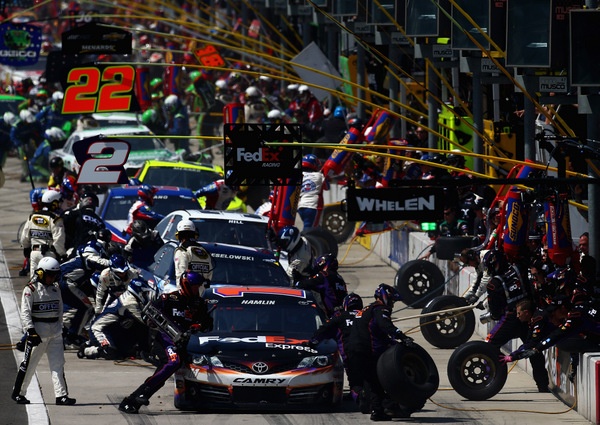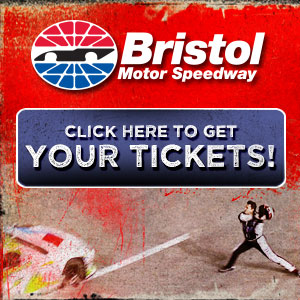Pondering NASCAR's pit crew championship: and first, who are these guys? If they win races, why aren't they 'stars'?

NASCAR pit roads get jammed, and you have to be brave to play this part of the game (Photo: Getty Images for NASCAR)
By Mike Mulhern
mikemulhern.net
CONCORD, N.C.
A lightning fast pit stop is a thing of beauty.
A brutish ballet on pit road.
Just image needing only 11 seconds to change all four tires and fill the tank with gas.
Watching it happen, on a tight playing field jammed with some 30 or 40 other teams, is breathtaking, particularly for those able to watch it up close. If only TV could do it 3-D justice.
A pit stop can not only change the complexion of a race, sometimes at the most inopportune moment for some, it can also win or lose the race itself.
Clearest example: Just last weekend Jimmie Johnson took advantage of Kyle Busch and Kurt Busch in the final exchange of pit stops to take the annual All-Star race, after the Busch brothers had dominated most of the night.

Jimmie Johnson's pit crew: the best in the business? (Photo: Getty Images for NASCAR)
It's always been this way of course in stock car racing.
The Wood brothers stunned the Indianapolis racing world in 1965 when they took their superlative talents to the Brickyard for the legendary 500, to help Jim Clark win. The Wood brothers at Indy 1965 (first pit stop at 4:10)
Pit road here is still filled with danger, though it's no longer as deadly as it once was, now that NASCAR has speed limits (one of NASCAR's most brilliant decisions).
Drivers here for Sunday night's Coke 600 never experienced this sport with unlimited pit road speeds (Mark Martin is the lone exception), so they were stunned with the thrills of All-Star qualifying, hitting 157 mph before sliding into the pits.
And some pit road decisions -- four tires? two tires? no tires? don't stop at all? -- are the stuff of legend.
Like Dale Inman's unexpected call at Daytona in 1981 that helped Richard Petty, in a slower car, beat much quicker Bobby Allison to win the 500.
Remember an angry Chad Knaus 'firing' his pit crew in mid-race at Texas and bringing in another crew?

Matt Kenseth on pit road (Photo: Getty Images for NASCAR)
Some of the best NASCAR action these past few seasons has been on pit road.
In part that's because the action on the track isn't always up to snuff. So if a quicker pit stop can put a driver out ahead of the pack, into 'clean air,' he can frequently just sail away...as Johnson did in the All-Star.
'Clean air' is a dirty phrase in this sport. Because the leader of the race typically has such a huge advantage over his rivals who are scrambling through the wakes and torrents of wind these cars make at these sizzling speeds.
Speed -- sizzling speed, to be more precise -- is the catchword so far this season. With the sleek new 2013s, aerodynamics has been taken to a whole new level. With exceptional downforce too.
(Drivers may not be publicly complaining, though, with that ever-present threat of a $25,000 fine from NASCAR for any 'discouraging' words is like a Damocles Sword over their heads.)

But don't real NASCAR pit stops have real drivers at the wheel, real engines screaming and tires smoking? (Photo: Getty Images for NASCAR)
Which brings us to the point:
NASCAR and Sprint decided not to hold this sport's annual pit crew championship this year.
Consider it a moment for reflection -- on how to reshape the pit crew championship format for next season's event....and on the pit crew situation overall. The two are intertwined.
For the annual pit crew competition in 2014, the logic is this: To stage the competition on Charlotte Motor Speedway property during 600 week, at Z-max Dragway right across the street from the big track.
Two teams competing side-by-side. The four-wide strip allows plenty of room for two pit boxes. And the stands are perfect for a competition like this.
Invite the sport's top 20 teams. Make it double-elimination, right up to the quarterfinals, with $1 million for the winners to share.
Hit the Easy button.
Now for the hard part.
First, who are these guys?
How many right-front tire changers or jackmen can you name?
To use a NASCAR concept, where's the 'star power' here?
Remember Junior Johnson slinging the jack....Kirk Shelmerdine's studious nonchalance at changing Dale Earnhardt's right front, contrasted with Joey Knuckles' flamboyant style.
Second, let's check the whole pit crew philosophy here.
When Ray Evernham first created the fully dedicated 'specialized' pit crew, for Jeff Gordon and Rick Hendrick, he hired the most talented pit crew guys he could find, signed a full-fledged pit crew coach, and flew them in each Sunday morning, like hired gunslingers. No race shop duties during the week. They didn't have to know a carburetor from an exhaust header. They just had to be strong and bad fast.
It was a brilliant success.
And quickly copied by rivals.
Pit crewman contracts and all.
Now Chad Knaus has taken it all to the next level. He's been working for some four years now on a innovative system of building in-house, hiring potential pit crew men fresh off college athletic fields, holding tryouts, and training them in this sport's nuances.

Ummmm, why are Jeff Gordon's guys pitting Jimmie Johnson's car? (Photo: Getty Images for NASCAR)
But, here's the catch, at what cost?
Literally what cost?
That's precisely what Bill France Jr. asked several years ago.
And France strongly considered a solution.
It may now be time, in this supposedly cost-conscious era, to realize the cost is too much, in several respects.
Philosophically, why can't NASCAR require pit crewmen to be 'real racers'? That's the way it used to be, back when Dale Earnhardt had his Flying Aces....
On another level:
On pit road, as in many things in this sport, money buys speed, to use Banjo Matthews' famous quote.
And pit road speed now buys 'clean air,' which can too easily lead to runaway races.
These stock cars are so templated-to-death, laser inspections and all, that it's nigh impossible for someone to be so significantly faster than another to be able to run a rival down and pass him. Not easily, that's for sure.
Clean air rules.
And given the tires teams have to run on, there is little room now for any change-up strategies. Consider Jeff Burton's gamble at Richmond, where he held the lead with two laps to go, facing a green-white-checkered, but on worn tires, and got blitzed by rivals who had given up track position for fresh rubber.
Driving a stake through the heart of this clean air demon may be difficult.
But there are ways to try, like slowing the cars down, and like getting rid of the oh-so-gimmicky 'wave around,' a rule that is not a safety issue as much as an artificial way to put the leader of the race out ahead of the pack and easier for the crowd to see.
The 'wave around' rule has become little more than just 'socialized racing,' with too many drivers and teams getting something for nothing. If you've been outrun or made a mistake or had some misfortune to fall a lap down, well, that's racin'. If a leader laps 20 cars, why should NASCAR put those 20 back on the lead lap? More to the point here, why should NASCAR give the leader 'clean air' like that, for free?
Besides, there is obvious entertainment benefit -- and this is supposed to be entertainment, remember -- to having the leader stuck back in traffic and having to fight his way back to the front.
Just giving the leader clean air at every opportunity simply makes no sense.
In fact it is clearly counterproductive.
However, that's not the only issue to raise here.
The bigger issue may be why does NASCAR allow high-dollar specialized pit crews at all.
When Bill France Jr. assessed the situation, he came very close to imposing a very simple solution: limit the number of crewmen that a team can bring to the track each race weekend. And no one flies in Sunday morning; every crewman has to sign in Thursday or Friday for the full weekend.
If a team could only have, say, eight men per race weekend, crew chiefs would have to make some tough decisions. Or trying to hire team engineers who can bench press 400 pounds and run a 4.5 40.
Team owners could save a bunch of money. And prospective team owners would not face such a stiff barrier to entry.
Fans might not see picture-perfect pit stops at every yellow....but, hey, what's wrong with that?
Another point to ponder, considering the lack of 'star power' on pit road:
NASCAR could require teams to establish solid pit crew rosters before the season opens, and require teams to stick to those rosters, except in rare cases, like injuries.
Give each team, say, a 10-man pit crew roster limit; that would provide a few backups.
The National Football League has maximum limits on its teams rosters.
The National Basketball Association has maximum limits on its teams rosters.
Why can't NASCAR use a similar approach for pit crews?
Require crew chiefs to submit their pit crew roster for the year by, say, February 1.
Insist teams play with that roster the entire season.
Make some of these guys 'stars.'

On pit road not everything always goes according to plan (Photo: Getty Images for NASCAR)
© 2010-2011 www.mikemulhern.net All rights reserved.
Web site by www.webdesigncarolinas.com







I really don't care who the pit crew guys are,
I really don't care who the pit crew guys are, and having races determined on pit road seems counterproductive if you want to see good racing on the track. From a fans' perspective, watching a green-flag parade with pit stops shuffling the order every 20 minutes isn't very interesting.
The pit competition started in Mooresville and
The pit competition started in Mooresville and was a great event. NA$CAR and TV decided to take it Time Warner Arena and make it into an advertising ($)event. They could care less about the the crewmen and what the event meant to them. Take it back to Race City and let the guys have some fun!
Thank you Mike for attempting to bring this up.
Thank you Mike for attempting to bring this up. 90 percent of the racing is in the pits under the "no passing under yellow" rule. Where good ol' boy number 2 could legally run about 90 miles an hour down pit road that time. NASCAR should decide if they are going to have car racing or going to have pit crew racing. Trying to have both is not good. It has been 24 years since one scoring snafu led to pit crew racing, more than a generation of fans have been deprived of "racing on the track and letting the chips fall where they may", when the yellow came out the first one in the pits may have an advantage. NASCAR (and gentleman's agreements) has just about every category screwed up, car specs, pit stop rules, dumb cost cutting rules, gabby folks on TV just saying noise, it is the only show so I still watch.
Post new comment